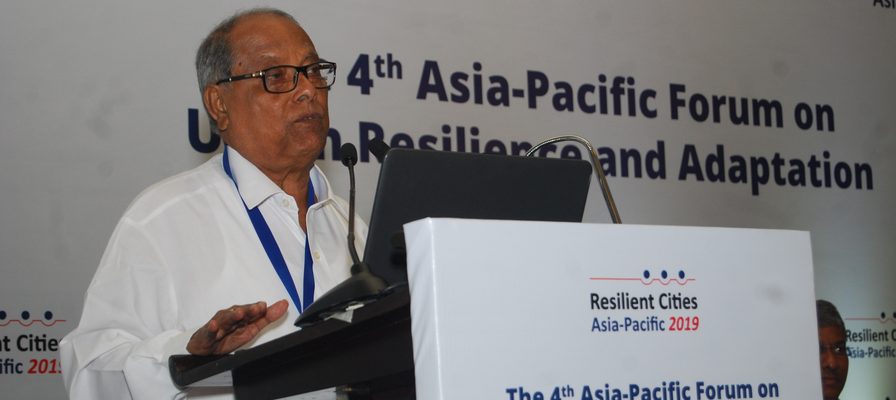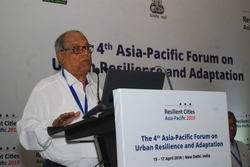Learnings and Insights on Integrated Action Planning for Urban Climate Resilience

The second plenary session of Resilient Cities Asia Pacific 2019 delved into looking at the outcomes and learnings from the CapaCITIES (Capacity Building Project on Low Carbon and Climate Resilient City Development in India) Project supported by Swiss Agency for Development and Cooperation. The session gathered key city representatives from Coimbatore, Rajkot, Siliguri, and Udaipur. Marylaure Crettaz, Head of the Swiss Agency for Development and Cooperation (SDC) for India, served as a speaker at the session along with Anand Iyer, Chief Project Manager, National Institute of Urban Affairs (NIUA) who is representing Suneet Mehta, Deputy Secretary (International Cooperation and AMRUT), Ministry of Housing and Urban Affairs, Government of India. The project presentations included details on the planning process undertaken for the preparation of the climate action plans and the lessons learnt. A video showcasing the work done under CapaCITIES, was also launched.
The session provided an overview of the CapaCITIES project, explaining that this initiative aims to strengthen the capacities of cities to identify, plan, and implement measures for reducing greenhouse gas emissions and for enhancing resilience. It built the capacity of the local governments of Coimbatore, Rajkot, Siliguri, and Udaipur to support them in planning and implementing mitigation and adaptation measures.
Asok Bhattacharya, Mayor, Siliguri, India shared that under CapaCITIES project, their city implemented the ClimateResilientCITIES Action Plan Methodology (CRCAP), a tool which enables local governments to analyze, act, and accelerate strategies and programs to promote low emission development and resilience. Mr. Bhattacharya noted that CRCAP has yielded extensive solutions for fragile sectors in Siliguri which when implemented can reduce GHG emissions by 14.6%. Noting the importance of citizen engagement, he said, “For CRCAP to be a realistic approach, it is imperative that increased people’s participation, environmental governance, and democratic decentralization be promoted.”
Meanwhile, Executive Engineer of Coimbatore K Sarvanakumar shared that their city is prioritizing integrated solid waste management at the moment. He shared that a lasting system has been set up in Coimbatore to ensure that waste is properly disposed and recycled if applicable. He also talked about their mechanisms to process and recycle electric waste.
Chetan Nandani, Deputy Commissioner, Rajkot Municipal Corporation shared that transport is a priority sector for his city. “For sustainable transport, Rajkot is working to make the transition to electric buses from diesel-powered ones. As of now, the city has 4 of these e-buses,” Mr. Nandani said.
Additional Chief Engineer of Udaipur Smart City Ltd Arun Vyas, noted that their participation in CapaCITIES Project enabled them to conduct a pre-feasibility technical analysis to determine the impacts and challenges that will surface along with the closure of their existing dumpsite. Through the project, they have also realized the need for awareness-raising, especially at the community level. “CapaCITIES has taught us how to achieve segregation of waste and the importance of IEC activities in achieving the same,” Mr. Vyas stated.
Stressing the importance of city-to-city cooperation and vertical integration, Marylaure Crettaz of SDC invited local governments to look beyond their boundaries and strive for collaboration with other sectors including the academe, national government agencies, private sector, and the communities.
Taking the discussion from the country to the region, the session requested interventions from representatives from Sri Lanka and Bhutan about their initiatives on climate action. Focusing on the contribution of the transport sector in greenhouse gas (GHG) emissions, Planning Officer of the Transport Development Division, Road Safety and Transport Authority of the Ministry of Information and Communications from Bhutan, Leki Choda noted that Bhutan has started to promote e-vehicles as an eco-friendly and climate resilient option to move towards sustainable transport. He also shared that Bhutan has earmarked a budget of at least 900 million Ngultrum (USD 13 million) as an investment to e-vehicle technologies and solutions.
“The surface transport services in Bhutan is going to focus more on coming up with strategic green transport planning in the next five years plan to contribute towards climate resilient cities and foster development in the context of climate change,” Mr. Choda stated.
This project-specific discussion with Indian cities was then followed with a broader discussion to bring up the resilient urban planning and solutions from other cities around the region and the globe. A second panel was organized in the session gathering key representatives from cities, non-government organizations and the private sector moderated by Hans-Peter Egler, Project Director of South Pole, Switzerland.
Sharing insights and learnings from Swiss cities, Reto Dettli from econcept Switzerland noted that there are similarities between how cities in South Asia and Switzerland approach climate resilience. However, there is a slight difference because, in Zurich, citizens actually take a public vote on setting targets for greenhouse gas emissions reduction. To this end, Mr. Dettli recommended promoting coherence and collaboration in approaching climate-related challenges and issues at the local level.
K.P Pravinjith, Managing Director of Ecoparadigm shared that in Coimbatore, they have set up technologies for waste-to-energy to promote innovative solid waste management. Similarly, in Rajkot, they have put together a decentralized system for treating sewage from slums.
Circling back to the discussion about the CapaCITIES project and its successful strategy in building capacities of the participating cities, Martin Buck, CEO of SNZ Consulting, noted, “CapaCITIES approach in the transportation sector is very promising and effective. It enables the cities to focus on urban transportation identified as a priority sector for GHG emissions reduction.”
Chief Project Manager of National Institute of Urban Affairs Anand Iyer and Executive Director of Water and Livelihood Foundation Rammohan Ramachandrula also served as panelists during this session.
(This article was published on ICLEI Southeast Asia website)




